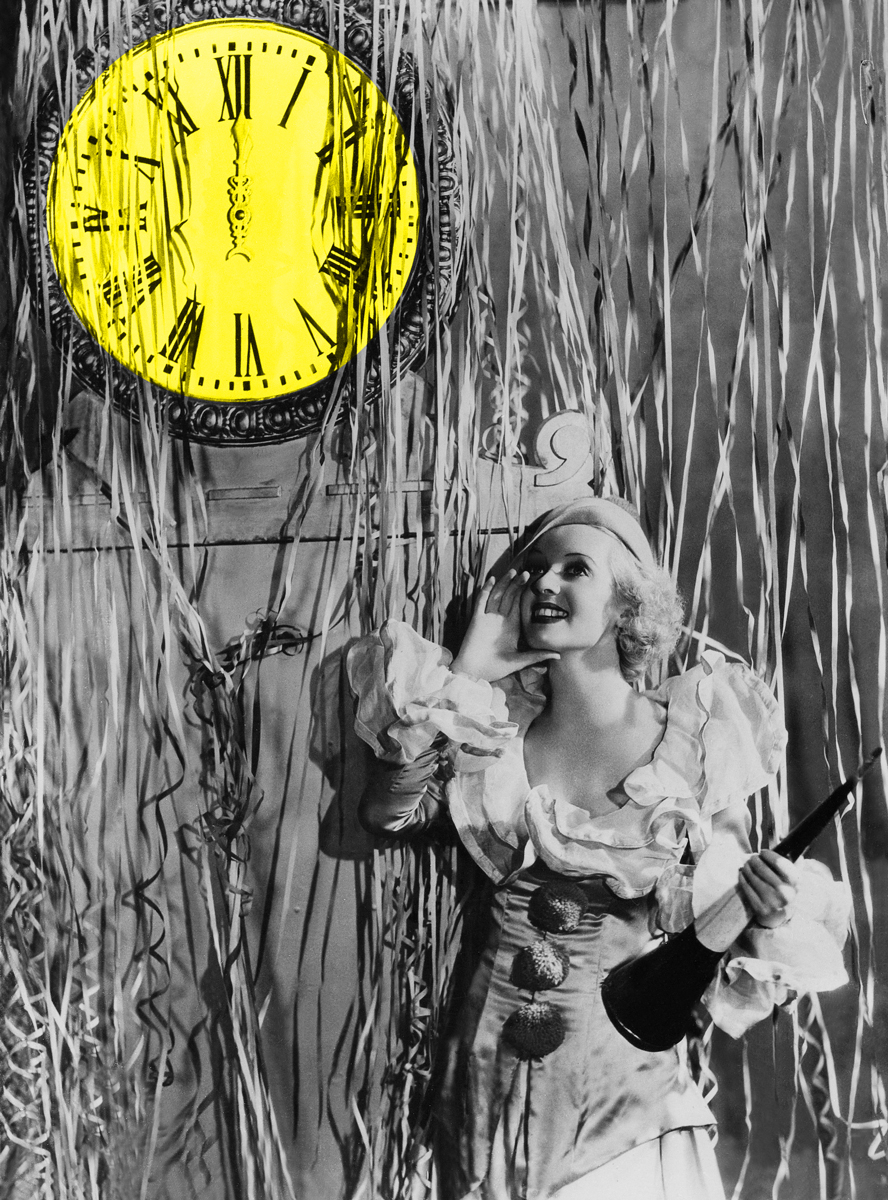Almost none goes from paper to reality. Few ever see the light of day. Only a tiny percentage, almost impossible to count, is actually put into practice. New Year's resolutions are a kind of a D. Sebastião of personal development: we continue to believe in them, to grasp them tooth and nail, even knowing that, whether out of habit or laziness, they will never stop being just that: New Year's resolutions.
Almost none goes from paper to reality. Few ever see the light of day. Only a tiny percentage, almost impossible to count, is actually put into practice. New Year's resolutions are a kind of a D. Sebastião of personal development: we continue to believe in them, to grasp them tooth and nail, even knowing that, whether out of habit or laziness, they will never stop being just that: New Year's resolutions.

Since the 1st of January 2017, which happened on a Sunday — a fact that did not go unnoticed in my list of “signs from the heavens”, a kind of invisible, and completely goofy, compendium of casualties that seem to happen just and only to show me that I'm on the right path — that I'm going to start exercising at least three times a week. I write “I'll start” because, in fact, the goal I set myself back there, almost five years ago, has yet to happen. Since then, this purpose has been renewed annually, with insistence reinforced each month, in the childish hope that a miracle will happen. Sometimes it happens. Sometimes I get excited and say “This is it” and do 20 minutes of elliptical — that stupid and monstrous object that occupies half of the room, whose function is to house coats and little else. The next day I repeat. And then I don't touch it for seven months. Between the time I promised to be healthier and the present, more than eighteen hundred days have passed. Had I fulfilled half of my purpose, I could have been training for the New York Marathon. Instead, I'm just whining grievances because I'm part of the unofficial club of people who don't keep their New Year's resolutions.
Few phrases are as universal as the famous “This is it.” We've all said it, at one time or another, in that moment of little presence of mind that is New Year's Eve. And what is it? Well, a lot of things, since the human mind can imagine the most preposterous feats. Examples? "Stop smoking." One classic. We repeat it without shame, cigarette in hand, in the certainty that this one is the last one and, if not, it is the one that precedes the last one, and so on. "Wake up early and look for a positive thought soon." Wow. Waking up would already be incredible, being able to look happy was a case for the Nobel Prize for Efficacy. “Be careful with your diet and explore new organic alternatives.” If being careful with your food is making sure you don't get hit by a bunch of angry McNuggets, it's easy. Otherwise, it's best to leave it to 2080, when the fries are a tuber like any other. "Lose weight." "Buy a house." "Gain weight." “Spend more family time.” “Learn something new.” "Make at least one trip a year." “Turn off the phone on weekends.” "Read 50 books." Bah. We're not yet halfway through the year and we're fed up, sick, with so many missions to accomplish. And yet, we continue to throw up a series of goals, some more realistic than others, which, for whatever reason, we still haven't managed to achieve. January rises like a cloud of hope, full of infinite possibilities, and we start again, always with childlike resilience, as if for a moment we had a superpower.
But why does this happen? Why, year after year, do we tend to make a list of things we want to change? We asked Filipa Jardim da Silva, Clinical Psychologist, Coach and Founder of Academia Transformar. “Resolutions and the setting of (new) goals help to define priorities in our life at a certain stage. They are like coordinates in our personal GPS: they give us a focus and a goal that guide us in managing our energy. They give purpose to our days. As long as they are flexible and well-defined, resolutions can be useful in our decision-making and lifestyle organization. To do so, it is best to take into account specific, measurable, achievable and defined ideas over time, as such non-compliance can generate frustration and demotivation. So choosing goals that are not priorities for us is a bad start. Another aspect is that these are stipulated in the short term and phased throughout the year.” Unfortunately, most of the time we end up abandoning these resolutions and goals shortly thereafter. Is there any reason we can't carry them out? “In my book Dar a Volta (Giviving Back) I talk about this: a desire doesn't change anything, but a conscious decision can change everything. We are often full of good intentions, but often we just hang around. If the intentions are on a very abstract plane — to have more time for me or take care of me more — they will eventually fade away after two to three weeks. It is necessary to have an action plan, which implies pointing to a concrete goal, relevant to us, with the definition of achievable and realistic goals. And then it takes consistency and commitment, in a daily exercise to go from intention to realization. We have to put it on our planner, it can't be just a wish, because we are overwhelmed by countless things on a daily basis. If resolutions do not enter the planner, new practices are easily abandoned. And considering that, on average, it takes about 66 days to acquire a new behavior, we realize the importance of being persistent.”
The persistence, or the lack of it, can also be linked with the content of the resolutions in question. There are things that, while highly desirable, are just unattainable — we all want to win the lotary, but it might not be wise to bet all our stakes on it. Others are toxic — it may not seem like it, but losing weight just to please your boyfriend/girlfriend is an attack on your body and your well-being. And so on. “There are resolutions that are not in line with our values and purpose in life, there are goals that are ambitious that do not respect us in our individuality, which, in order to be achieved, run over physical and psychological needs. Therefore, there are resolutions that are 'not worth it' in the sense that they disrespect us, that correspond more to the expectations of others than to our desires, that are more in line with our ideas that are out of date or that are totally out of line with the person we are. One of the factors that most contributes to the failure to achieve ambitions is the definition of the objective itself, which is often poorly constructed, being abstract, unattainable, immeasurable or not very relevant to us. That's why it's really important to clarify what's a good goal and what's a bad one, so that we can mobilize for what really matters and contributes to our well-being and personal development.”
So is it better to throw the towel on the floor, give up? No, guarantees Filipa Jardim da Silva. “There are strategies that enhance the achievement of our resolutions. First of all, the definition of goal itself, which is important that it is aligned with the person we are at the moment and with our current dreams and ambitions, it has to take into account our starting point and to respect our physical and psychological needs. We have to break down big goals into small goals, which allow us to keep motivated and with a sense of permanent achievement. For this, these goals need to be realistic, relevant and measurable. Then, a plan must be built: how will I, day after day, contribute to achieving my resolution? What will I actually do? But more than an obsession with the result, you have to learn to enjoy the process. Achieving a goal is challenging. Breaking a habit or introducing a new habit is a difficult process. It requires consistency, discipline, focus and resistance to frustration. Another impactful strategy is to mobilize a support network that strengthens us in the process of reaching our goals. This can contribute to keeping us hopeful and motivated throughout this process.” Changing costs. It's difficult. “Change is a process that mobilizes complementary forces, because understanding with the head is different from understanding with the heart, because in addition to information, we need commitment, because change is a spiral staircase, in which we need resilience and self-control if we want to be successful. Change implies mobilizing energy, commitment, accountability for our action, persistence and resilience.” When there's none of that... there's the next day.
We got used to hearing the English saying “every day is a new beginning.” We got used to believing in this almost-infinite chance to reset and change our lives. But to what extent can we change everything, make plans, set new goals, make new promises and New Year's resolutions? Is there any limit to all this? Filipa Jardim da Silva explains: “All big changes start with a small step. And at any moment of any day, we can take a small step, which by itself will not transform anything, but which, if repeated consistently, day after day, can contribute to big changes. We can't change everything in our life, but we can change the way we see everything that exists and, as a result, change our relationship with ourselves and with life. Every day is a new opportunity to be different, to treat ourselves more like humans than robotic doers, to say yes to ourselves and not to others. Therefore, I would say that every minute constitutes new opportunities in which, more than starting over, we want to continue with the learning that has been accomplished in the meantime.” I'm looking at the bike. It's a little to the new year.
Originally published in the Time issue of Vogue Portugal, from December/January 2021/2022. Full credits and story on the print version.
Most popular

O que lhe reservam os astros para a semana de 27 de janeiro a 2 de fevereiro
27 Jan 2026
.jpg)

Relacionados





